A land of beaches, hills, islands, and mountains, Portugal is a great idea for anybody looking for a slice of nature. Add to that Portugal’s former colonial riches, which are reflected in the stunning architecture of Lisbon and Porto, and there’s even more reason to go.
But there’s one problem: petty theft. It’s a huge issue in Portugal, especially around tourist areas. The steady influx of visitors and a layer of unseen poverty collide here, and, for thieves, it’s an opportunity.
To help you steer clear of these thieves and to prove that Portugal is safe, in fact, we’ve created this epic insider’s safety guide.
We’re going to be sharing a ton of ways to stay safe in Portugal. We’ll talk about the safety of the roads in Portugal (and if you should be driving on them), how safe it is for female travelers, and just about everything else in between.
You may be wondering if Portugal is a good destination for you as a solo traveler, you may be wondering if Portugal is a good place to travel with children – you may just be wondering how safe Portuguese food is. Whatever your concerns are, we’re here to help.

Unlock Our GREATEST Travel Secrets!
Sign up for our newsletter and get the best travel tips delivered right to your inbox.
How Safe is Portugal? (Our take)
With a ton of history to learn about, some pretty stunning architecture to gawk at, and plentiful beaches, we’re all for a trip to Portugal.
And actually? It’s one of the safest countries in Europe as crime levels are very low.
But that’s not to say that it doesn’t come without the usual annoyances you find in tourist areas. Cities like Lisbon and other cities have higher crime rates than rural areas, for example. In urban areas, petty theft is a serious issue. Pickpocketing and bag snatching is common, unfortunately, which always sucks.
With the rising numbers of visitors, would-be thieves are having a field day with unsuspecting tourists. So basically, it pays to not be unsuspecting and you have to be vigilant in busy areas.
There are also seedy sides to Portugal’s towns and cities, too. Drugs and prostitution aren’t exactly rare in certain neighbourhoods.
Nature-wise, the hot weather can be actually dangerous. Not only for stuff like sunstroke, but forest fires in the summer are a real threat.
All that being said, we’d say Portugal is absolutely safe on the whole.
There is no such thing as a perfect safety guide, and this article is no different. The question of “Is Portugal Safe?” will ALWAYS have a different answer depending on the parties involved. But this article is written for savvy travellers from the perspective of savvy travellers.
The information present in this safety guide was accurate at the time of writing, however, the world is a changeable place, now more than ever. Between the pandemic, ever-worsening cultural division, and a click-hungry media, it can be hard to maintain what is truth and what is sensationalism.
Here, you will find safety knowledge and advice for travelling Portugal. It won’t be down to the wire cutting edge info on the most current events, but it is layered in the expertise of veteran travellers. If you use our guide, do your own research, and practise common sense, you will have a safe trip to Portugal.
If you see any outdated information in this guide, we would really appreciate it if you could reach out in the comments below. We strive to provide the most relevant travel information on the web and always appreciate input from our readers (nicely, please!). Otherwise, thanks for your ear and stay safe!
It’s a wild world out there. But it’s pretty damn special too. 🙂
Is Portugal Safe to Visit Right Now?
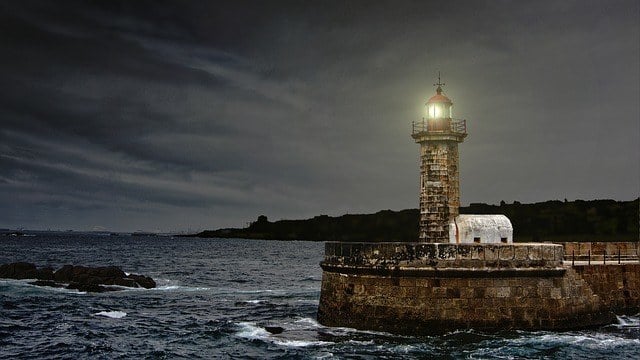
At the moment there’s nothing stopping you from visiting Portugal.
In fact, whilst much of Europe is currently tending to lean towards ring-wing politics, Portugal has gone the other way and has elected a socialist government. We think that says something about Portugal, at least.
In the 2020’s Global Peace Index, which measures the essential safety and stability of a country, Portugal ranked 3rd. That’s ahead of Denmark, Canada, Singapore, AND Japan. And the ranking has actually improved over the last couple of years.
So yes – Portugal is safe to visit.
Due to its relative security, Portugal is getting more and more popular as a tourist destination. In 2019 over 27 million people visited Portugal. That number obviously fell down during 2020 thanks to the pandemic, but the numbers are actually rising again.
Thieves still do operate and actively target tourists. That means pickpocketing around tourist attractions as much as robbery of holiday homes. Sad but true: more tourists = more opportunity.
But generally? Your life should almost never be threatened. Now is the perfect time to visit Portugal. It is as safe as it gets right now. In fact, it’s safer than in most parts of the world.
Safest Places in Portugal
When choosing where you’ll be staying in Portugal, a bit of research and caution is essential. You don’t want to end up in a sketchy area and ruin your trip. To help you out, we’ve listed the safest areas to visit in Portugal below.
Lisbon
Lisbon is wildly popular with tourists with good reason. Whether its urban art, world-class nightlife, museums, architecture or culinary experiences you are looking for, Lisbon has you covered. There is as much history as there is modern fashion and shopping. Yeah, you’re going to love Lisbon!
While it definitely has its fair share of problems with pickpocketing crime, it’s still an incredibly safe city. You’ll see plenty of tourist police patrolling the city as well. And speaking of, in case anything should happen to you, reaching out to this tourist police is a great idea. They’re known to be very helpful.
Faro
Faro is the capital of southern Portugal’s Algarve region. It’s a gorgeous, coastal city that promises you true relaxation. Walking around the old town, with its iconic cobblestone streets, is a treat for young and old, which makes Faro a great destination for families.
Although Faro is a capital city, don’t fear, it’s not a hustle and bustle situation here. In fact it’s incredibly laid back and relaxing. Plus, it’s right on the water at the corner of the Atlantic Ocean and the Cadiz Gulf, which means plenty of white beaches to choose from!
Lagos
Located on the Southwestern tip of Portugal, Lagos is situated perfectly for kayaking, scuba diving, hiking, surfing, and most other outdoor activities you might want to do. It is only a twenty-minute drive to the closest point of the Southwest Alentejo and Vicentine Coast Natural Park, one of the largest parks in Portugal.
You can see the scenic rock formations at the Ponta da Piedade, and hike down the steep steps to the tiny, and completely magical, Praia do Camilo sandy beach which is one of the most spectacular beaches in Portugal. And why not take a fun boat trip to check out the legendary Bengali Caves – it’s definitely worth the trip!
Places to avoid in Portugal
In order to have a safe visit, it’s important to know the areas in Portugal that aren’t super safe. Keep in mind that Portugal is a famous tourist destination, so wherever you are, you will have to watch out for pickpocketing and petty theft.
Luckily, most of Portugal is perfectly safe, even at night. The following areas are absolutely fine to visit, they’re just known to attract more thieves and scammers. Threats of physical crime are pretty much non-existent though.
- Around famous tourist attractions
- Alfama and Bairro Alto districts, the Castle of São Jorge
- Train stations, including the Rossio, Oriente and Santa Apolonia
- Belem neighborhood
- Towns of Mafra, Fatima, Sintra, and Cascais
Portugal Travel Insurance
ALWAYS sort out your backpacker insurance before your trip. There’s plenty to choose from in that department, but a good place to start is Safety Wing.
They offer month-to-month payments, no lock-in contracts, and require absolutely no itineraries: that’s the exact kind of insurance long-term travellers and digital nomads need.
SafetyWing is cheap, easy, and admin-free: just sign up lickety-split so you can get back to it!
Click the button below to learn more about SafetyWing’s setup or read our insider review for the full tasty scoop.
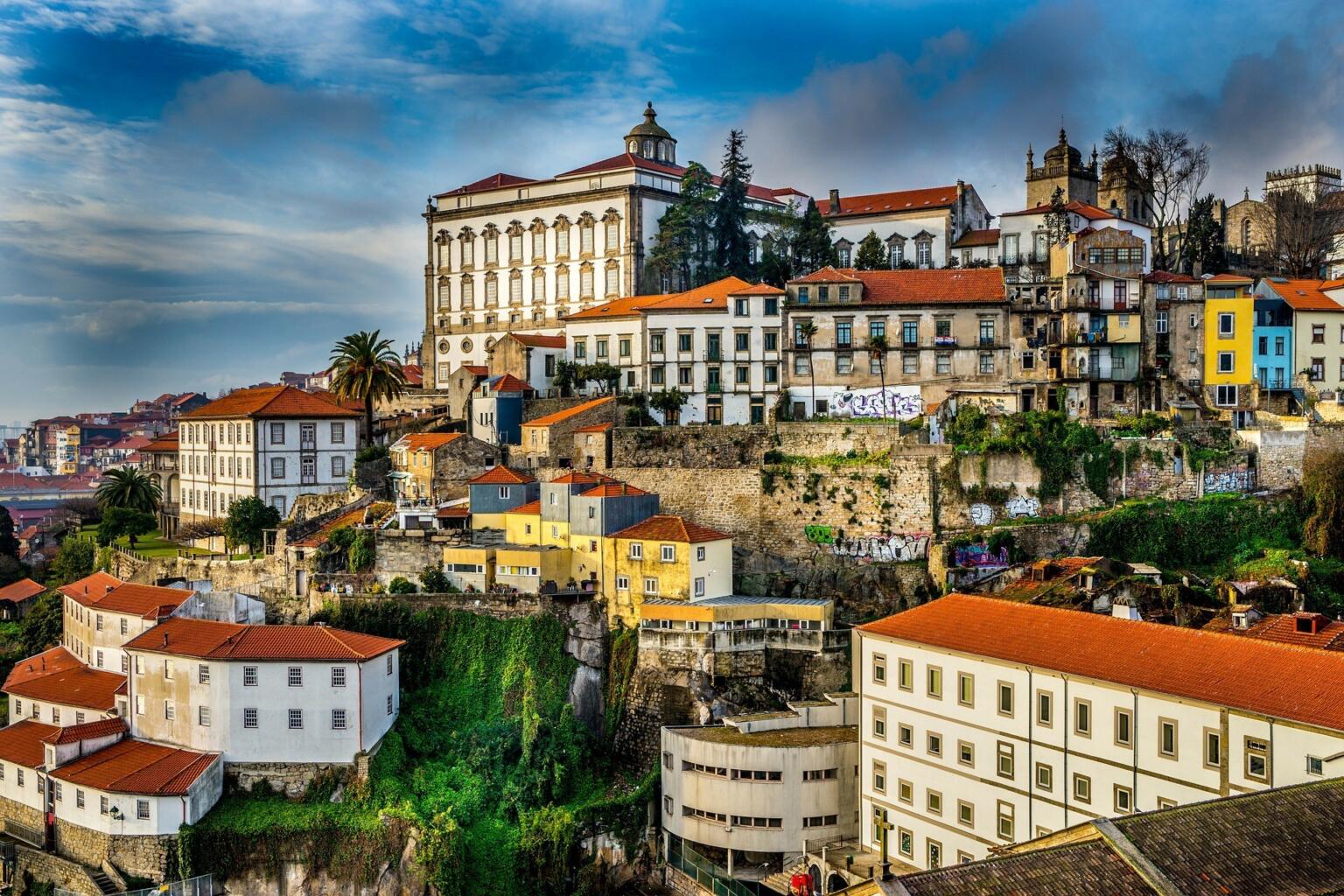
On the whole, Portugal may be one of Europe’s safest countries, but that doesn’t mean tourists are immune. In fact, you’re more likely to be targeted as a tourist. Pickpocketing on public transport and even muggings do occur.
The solution? Don’t look like a tourist. With that in mind, we’ve got together a whole load of tips for travelling safely in Portugal so you can keep your wallet intact.
- Know about areas rife for crime – in Lisbon, the stations of Santa Apollonia, Rossio, and Oriente are known for their petty theft.
- That goes for the trams in Lisbon too – particularly the Number 15, and Number 28 tram that goes to Sao Jorge. Watch out.
- Be vigilant on ALL public transport – stay close to the people you’re with and keep your belongings close to you. You can use a money belt, which the ultimate way of keeping cash on your person.
- Keep bags on your lap while in restaurants – hanging on the back of a chair? Under the table? Nope. Keep them in sight at all times.
- Keep a copy of your passport on you at all times – the police might want to see it and it’s not worth having the real thing swiped by a thief.
- SCAMS – Over-friendly people, distraction techniques; these are all elaborate ploys to get your cash. Read up and practise vigilance.
- Don’t buy drugs on street corners in Baixa, Lisbon – the drugs are fake, the dealers are dodgy. Ignore all offers.
- Head to tourist police in Lisbon – if you have any trouble.
- Leave valuables in a safe or secure place – hotel rooms and hire cars have been robbed. Don’t leave stuff on show, basically.
- Lock your doors and windows when you go out – we mean, this is a normal thing to do in cities anyway.
- The sea is DANGEROUS – people have lost their lives due to powerful waves and undercurrents at some beaches. Lifeguards can and will report you to the police if you disobey warning flags. This means a fine.
- And don’t leave your stuff unattended at the beach – this is just easy pickings.
- Watch your surroundings at the ATM – again, fresh money is easy pickings.
- Don’t walk around looking flashy/like a tourist – dangling SLR, jewellery, designer clothes, looking lost, shouting around in English; this makes you look like a target.
- Be careful of the heat – it can get hot, hot, hot in Portugal. Keep hydrated, limit your time in the midday sun, cover up. Always pack a water bottle with you.
- Don’t push yourself when hiking – like we said: hot. The levadas in Madeira are great but routes can go on for ages. If you don’t have enough food and water on you, it can get horrid pretty quickly. Also they can precarious, so take it slow.
- Forest fires can spread quickly – if they’re happening, keep tuned in to the news. Things can turn ugly quickly.
- Don’t CAUSE a forest fire – dropping cigarette butts, having a BBQ in woodland areas, or even leaving glass bottles behind; these can cause literal devastation.
- Know your limits with alcohol – party resorts are notorious in Portugal. Being completely trashed can end in tears. Or worse.
Basically, Portugal is safe. But it’s in the cities, mainly Lisbon, where you will probably encounter some annoying, tricky characters.
The main thing is to know which neighbourhoods not to walk around, to not look like you’re an easy target, and to PAY ATTENTION to your surroundings. It’s all about travelling smart – be savvy and you’ll be alright!
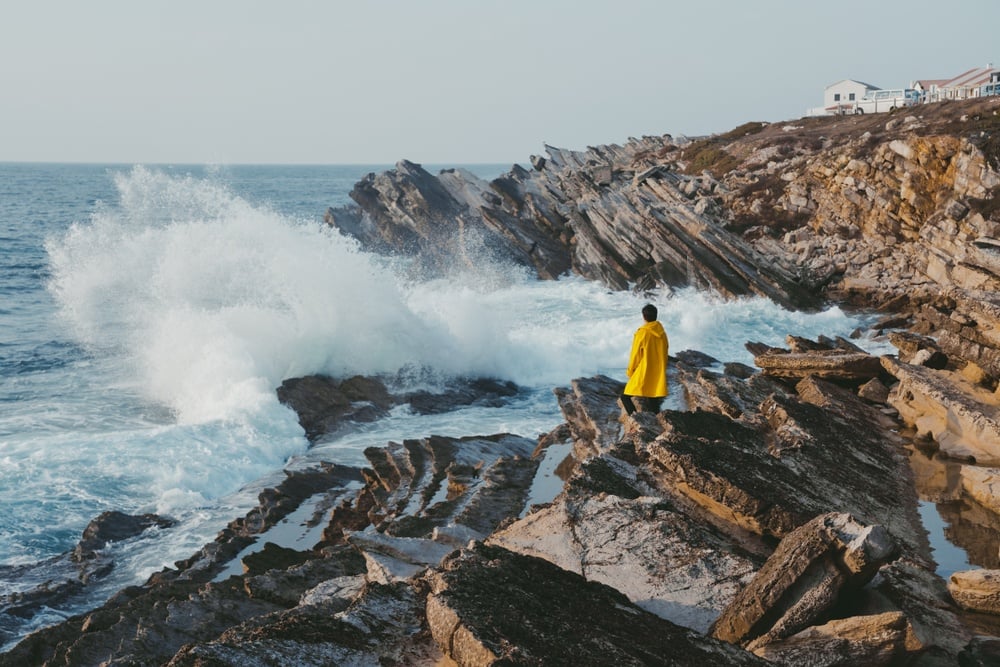
We also absolutely endorse solo travel because, honestly, it’s awesome. Not only do you have basically nobody to answer to, but you also get to challenge yourself and reap the rewards. Any solo travel experience is definitely going to level you up as a person.
Portugal is somewhere you can travel around by yourself very safely. You’ll still have to worry about thieves, maybe even more because you’re an easier target.
So here are some tips to help you on your way. A lot of these will help stay sane and avoid the dreaded travelling blues as well.
- Definitely, stay at a hostel. Hostels are usually located in decent, central areas and, depending on what you’re looking for, have different atmospheres.
- So you’ll want to do your research when it comes to accommodation. You’ll want somewhere social (probably) but reading reviews will ensure you’re not at a mental party hostel when you don’t want to be.
- Make some friends. This makes it more fun to go out at night. It’s also cool to chat, share tips, and even get together a travel buddy or two for your onward journeying. Helps to beat the solo travel blues, too.
- And make sure you keep in touch with people back home. It’s NOT cool to ignore family because they might be genuinely concerned.
- Watch out for alcohol. It’s cheap and often stronger than you’re used to. Before you know it you could be on the floor; literally.
- Find out about local meet-ups. There are loads of different events organised throughout Portugal that are specifically for, well, meeting people. You can meet locals and other travellers.
- You could also take a tour. Most hostels offer walking tours which are a great way to not only get to know your local area but are also great for making friends with the other travellers you’re bunking with.
- Learn some Portuguese – it will help you get around, order food, chat to locals, generally just a lot better than communicating in English.
Because you’re alone, you’ll have no one to bounce ideas off or keep you in check if you’re out getting drunk. So YOU’RE going to have to be the boss of yourself. Make sure you know when you’re getting stupid and you should be fine. At the same time, don’t lock yourself up inside.
Is Portugal safe for solo female travelers?
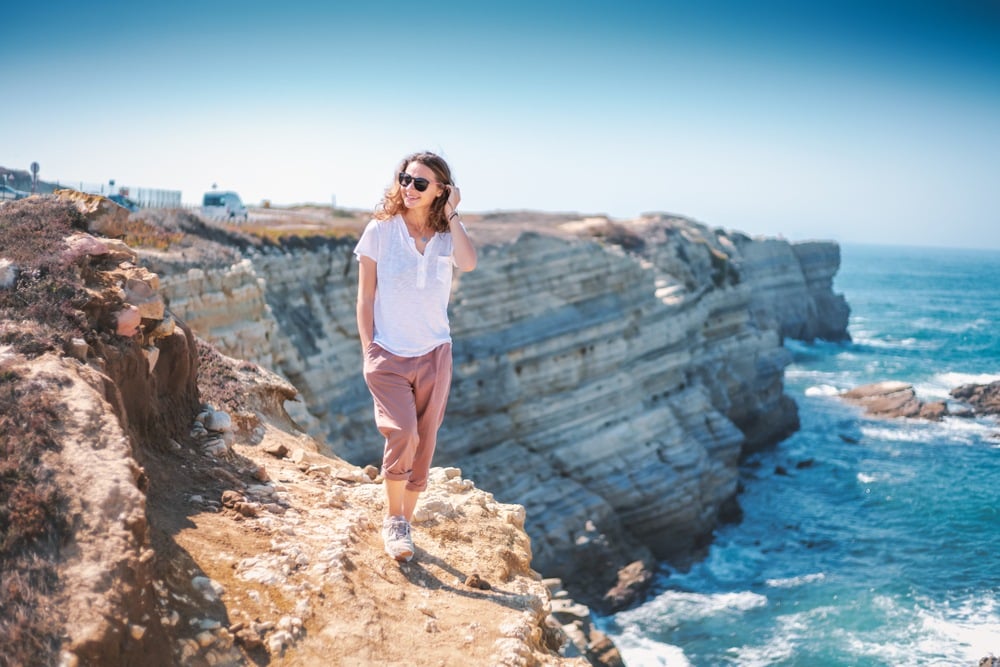
Portugal is a great place for solo female travelers. It feels safe, there’s loads of different things to get up to, and many women travel in Portugal by themselves with hardly any hassle at all.
But women anywhere in the world sadly have to take more care in certain places than men. For example, Northern Portugal tends to be more machismo than the south.
Here’s how you can enjoy everything that Portugal offers – and more – as safely as possible.
- We recommend that you buy your own drinks and not leave them unattended. Even if the person who offers SEEMS nice, drink spiking does happen.
- If you’ve made a group of mates and you head off for a night out, try not to get split up. Being alone in a city at night puts you at a much higher risk of something dodgy happening. Not knowing where you are, and being drunk at the same time, can all just lead to a bad situation. Stick together.
- Stay in a well-reviewed hostel. Honestly, the hostel scene in Portugal is awesome. There are some super cool places you can stay at like the hostels in leiria. Just make sure you do your research and pick somewhere that comes with A LOT of high ratings and that suits you.
- Portugal is a friendly place and Portuguese people are warm and welcoming. If you feel like you’re in trouble, or lost, or just need some help, asking a local is going to more than likely going to yield positive results.
- You can pretty much wear what you like in Portugal. Just be respectful if you go to churches and cathedrals. And if you’re heading to countryside areas, we recommend smart-casual.
- Rural areas are old-fashioned. As such, the role of women in the countryside may seem a bit archaic. For example, one tip is to greet a woman before you greet the man so you don’t alienate anybody. Knowing about this and other customs, and following them, is going to help.
- With that in mind, men may stare. Men may make comments. The best line of action is to simply ignore it.
- And as with anywhere in the world, walking around alone at night isn’t advised. In busier areas, it’s probably fine, but in deserted streets, this is going to be risky.
Generally, solo female travellers are going to be safe in Portugal. It’s an amazingly fun place to travel around, but as long as you remember that in some parts it’s not as liberal as you might like it to be and that weirdos exist everywhere in the world – you should be fine.
More on Safety in Portugal
We’ve covered the main safety concerns already, but there are a few more things to know. Read on for more detailed information on how to have a safe trip to Portugal.
Is Portugal safe to travel for families?
Portugal is a PRIME SPOT for a family holiday.
It’s well equipped for family fun. There are loads of resorts and guesthouses for you to choose from.
There are a lot of family-friendly beaches in Portugal too, most of which are in the Algarve. These often come with water parks, zoos, and adventurous activities for children of ALL ages. Heading out on a kayak is always fun.
Lisbon isn’t bad for a short break with kids, either, as there are plenty of child-friendly museums, parks, and fun tram rides here.
But wherever you choose to go, your children will be welcomed. Portugal is a laid-back place with a big emphasis on family.
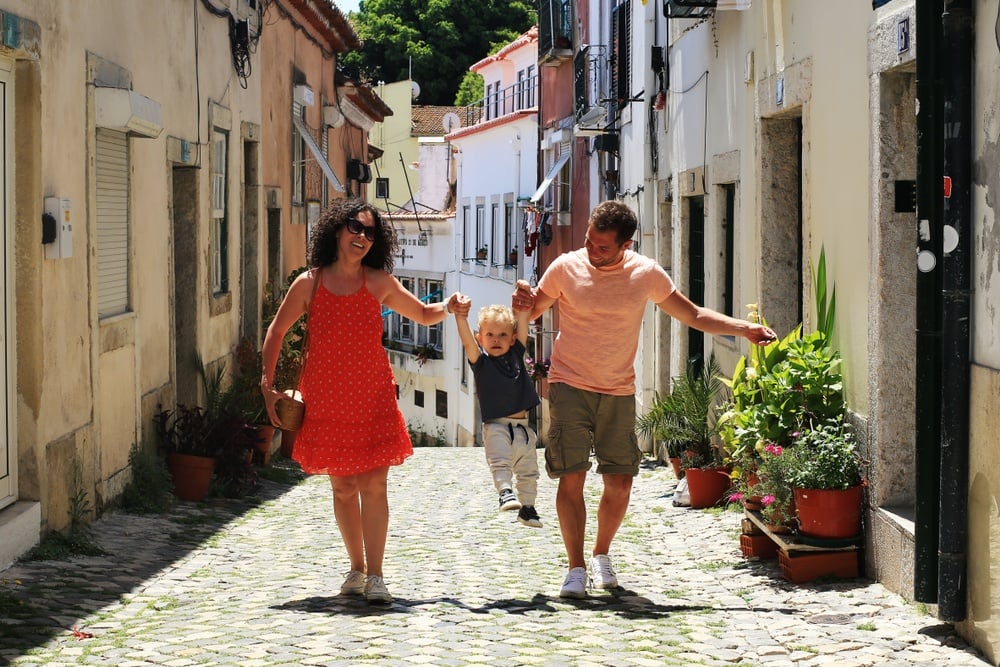
It’s important to remember that Portugal can get super hot. Really hot. So you’ll have to make sure your little ones don’t stay in the sun for too long.
Staying hydrated is also a good way to not get sunstroke, too. Make sure everyone has a full water bottle and that they use them.
When it comes to the beaches, you’re going to want to keep an eye on your little ones as rip-tides can be dangerous. There will be lifeguards on the most touristed beaches, but there’s still enough worry about big waves and currents that you should be watchful, too.
You’ll want to keep your children protected against mosquitoes. Long sleeves and trousers when you head out in the evening and plenty of mosquito repellent should do it.
Is it safe to drive in Portugal?
Diving in Portugal can be beautiful. There is an ever-growing network of roads, all of which are in pretty good condition. And some of which are super scenic.
On the other hand, driving in Portugal is not for first-timers, nor is it for the faint-hearted. It can be SUPER scary driving in Portugal and that’s ONLY because of the other drivers whom you’ll be sharing the road with, honestly.
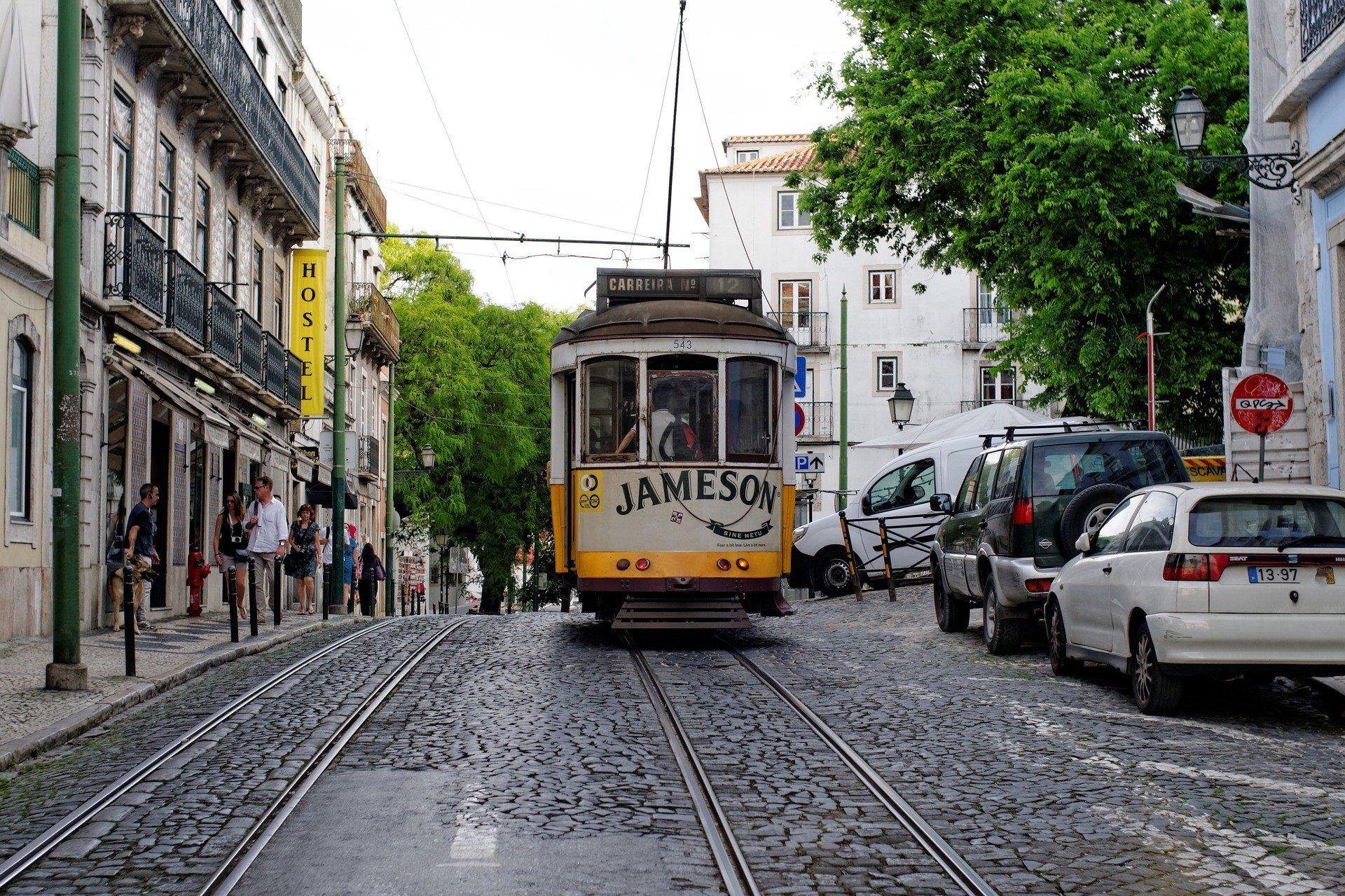
Portugal has one of the highest road fatalities rates in Europe. That’s almost double the rate of the UK, in comparison. This is mainly down to speeding but also reckless driving, which includes drink driving, is another major culprit.
A lot of people do drive themselves around Portugal. It’s a great way to open up the country away from its public transport network.
So unless you’re a driver with nerves of steel, we’d say it ain’t worth it. Unless you’re seriously fixated on a road-trip.
Is Uber safe in Portugal?
Yep, Uber is definitely safe in Portugal.
It operates in Lisbon, Porto, and around the Algarve.
And whilst it’s not exactly a big money saver compared to regular taxis, it does save you a whole lot of hassle. You’ll have no problems getting one, language won’t be a barrier, you can track your ride, know exactly how long it will take, there won’t be any overcharging. It’s great!
Are taxis safe in Portugal?
Taxis in Portugal are generally safe. They’re a good option for travelling late at night or getting from the airport to wherever you’re staying.
But, of course, they come with the usual string of annoyances that you can expect of taxis in almost any country.
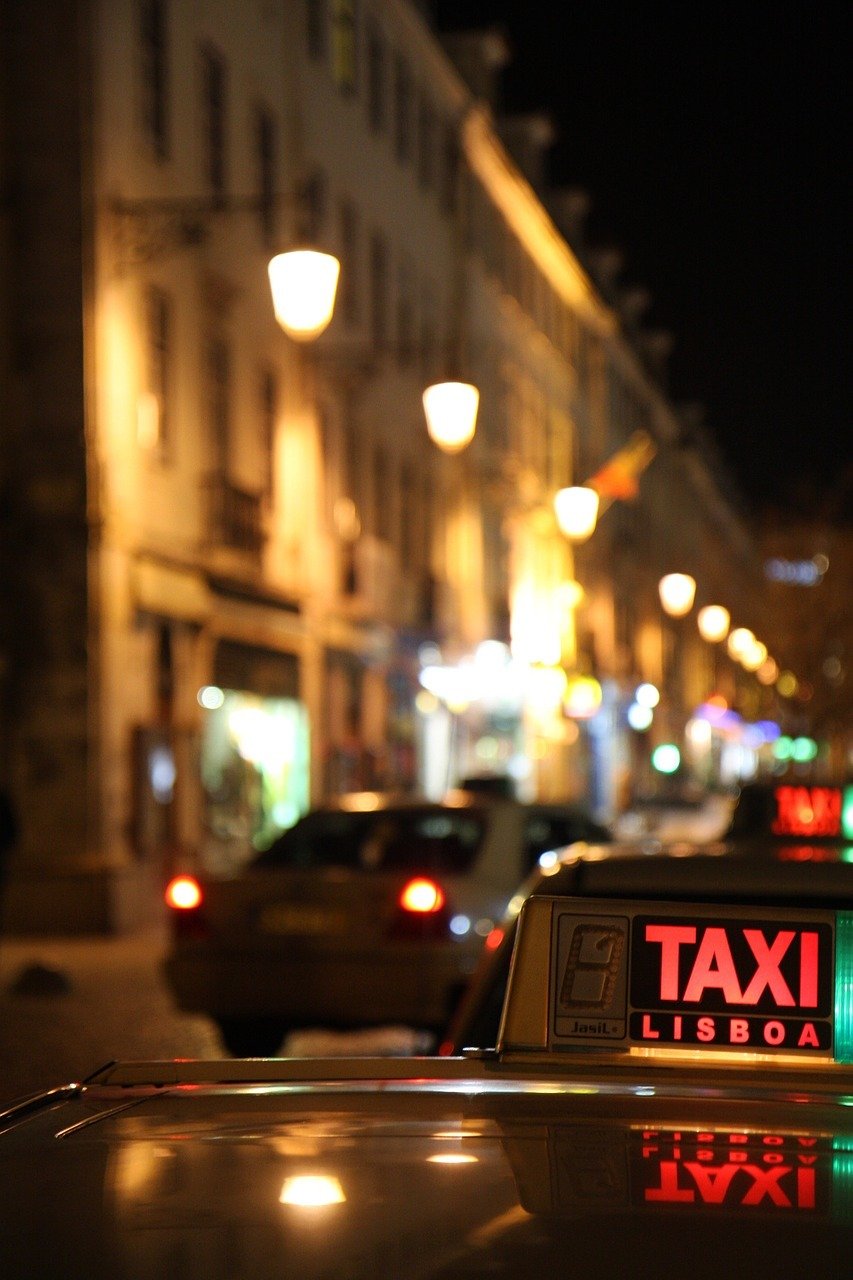
- In Lisbon, for example, you will have to make sure that the driver is using the metre and charging you a fair price.
- In other areas, such as the Azores, they don’t use a meter at all. You’ll get charged a basic per kilometre fare. You should know the rough distance you’re travelling so you’re able to negotiate.
- Most taxi drivers, especially older ones, won’t speak much English at all, but they’re pretty polite anyway. A little bit of Portuguese is going to help.
- They do tend to drive pretty fast, however.
- When it comes to getting a taxi, we’d recommend taxi ranks, which you can find in busy tourist areas around cities and towns.
- Taxis look like taxis. They’ll have “taxi” written on them somewhere with a light on the roof. All taxis must be registered.
- At the airport, pay for your taxi at a counter and get a receipt. This may be a little more expensive but will ensure that you get an honest driver and avoid any hassle with people who may try to rip you off.
Generally? Taxis are safe in Portugal. All good.
Is public transportation in Portugal safe?
Public transport in Portugal is pretty extensive. There’s a whole host of different options, all of which are affordable and will get around the cities and towns as well as between them, too.
In cities, especially Lisbon, you’ll have to watch out for pickpockets on the trams that are most popular with tourists. We’ve already mentioned two notorious ones: the Number 15 and Number 28 trams.
The train network is good and there are some beautiful journeys to be had. As an added bonus, Portugal’s trains are some of the least expensive in Europe. Be aware that some of them may be rickety old artifacts though so be sure to inquire which one you’ll be taking.
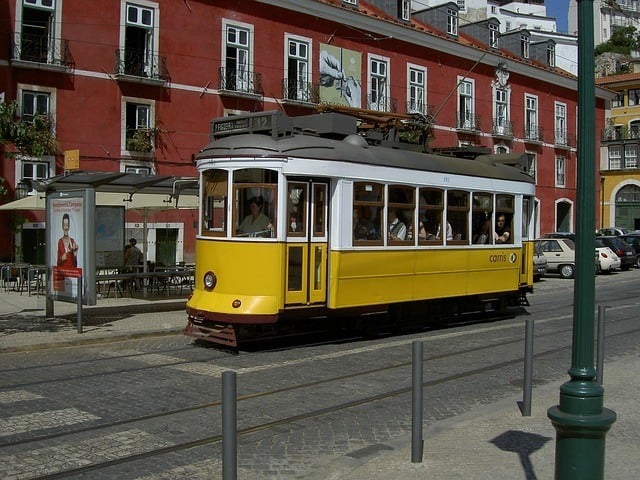
Train stations are often quite far from destinations with the same name, meaning you’ll find yourself a few kilometres from the city centre, usually. But in Lisbon and Porto the metro will sort you out from the main train stations.
Buses can be really complicated, especially when you’re in the smaller towns. Reading a bit of Portuguese, or simply knowing your destination, will help you get to where you need to go. In tourist areas, however, buses are relatively straightforward.
You can also get long-distance buses between destinations. These are pretty efficient, pretty cheap, and you won’t have to worry about getting a seat.
So, yep, public transportation is safe in Portugal. Just remember that these are hotspots for petty theft.
Is the food in Portugal safe?
Portuguese food is NOT Nando’s, but fans will be happy that frango assado (REAL piri piri chicken) does exist still and that Portuguese cuisine is generally tasty. So get your tongues and tummies ready for an array of Atlantic-Mediterranean delights.
All of that rich food can upset your stomach though. To ensure you have a fun timing eating, here are some tips to avoid any mishaps.

- If you’re staying in a hotel, be careful of the buffet. This is how most people get ill when they’re on holiday in Portugal. That’s simply because stuff is sitting around for too long, uncovered. And also bad hygiene standards.
- Fancy something tasty for lunch? Head to somewhere busy with locals. Queues often mean that you’re going to be safe in terms of hygiene standards.
- It’s also handy to note that places which look clean probably are, too. Head to clean-looking places if in doubt.
- If you’re the kind of person who usually gets a bad stomach when you’re away, then maybe ease yourself in. The fiery chilli peppers, garlic, and a whole load of other spices can be a little bit different to what you’re used to.
- Let’s talk about fish and seafood. This sort of thing can make you super ill if it isn’t fresh. Make sure what you’re eating is fresh. Eat seafood at the sea, landfood when you’re in the hills. (Is landfood a real word?)
- There’s a lot of offal on offer – animals guts, leftover parts, tripe, that sort of thing. So if you order something like a meat stew, you may get a few surprises floating around in it. Do some research on what you’d like to order.
- And on that note, maybe learn some food-related Portuguese. You might be able to tailor-make your meals. At least you’ll know what sort of ingredients you’re going to be getting in your dinner.
- WASH YOUR HANDS. You don’t know where your grubby fingers have been, all over public transport and whatever. If you can’t wash, sanitise.
As always, use your head. It may seem counter-intuitive to a backpacker, but eat where other people (especially locals) are eating and you should be mostly fine!
Can you drink the water in Portugal?
YES – you can drink the water in Portugal! The water in Portugal is perfectly safe.
However, a lot of people choose to NOT drink the water because they don’t like the taste. Many people prefer bottled water.
If you’re picky about how your water tastes – or you just REALLY want to be on the safe side – go for bottled.
Otherwise, spare the Earth the extra waste and refill a good water bottle from the tap. You’ll get our seal of approval if you do.
If you want to explore the backcountry, we’d suggest boiling and filtering your water or using The GRAYL GEOPRESS.
Is Portugal safe to live?
We’ve established already that Portugal is the third safest country in the world (according to the Global Peace Index 2020).
So… yeah…we reckon living in Portugal is pretty safe.
However, out of the ordinary things CAN and DO happen in Portugal.
Homes owned by foreigners have been known to be burgled. And owning your own home in a more remote rural area brings a higher risk of that happening.
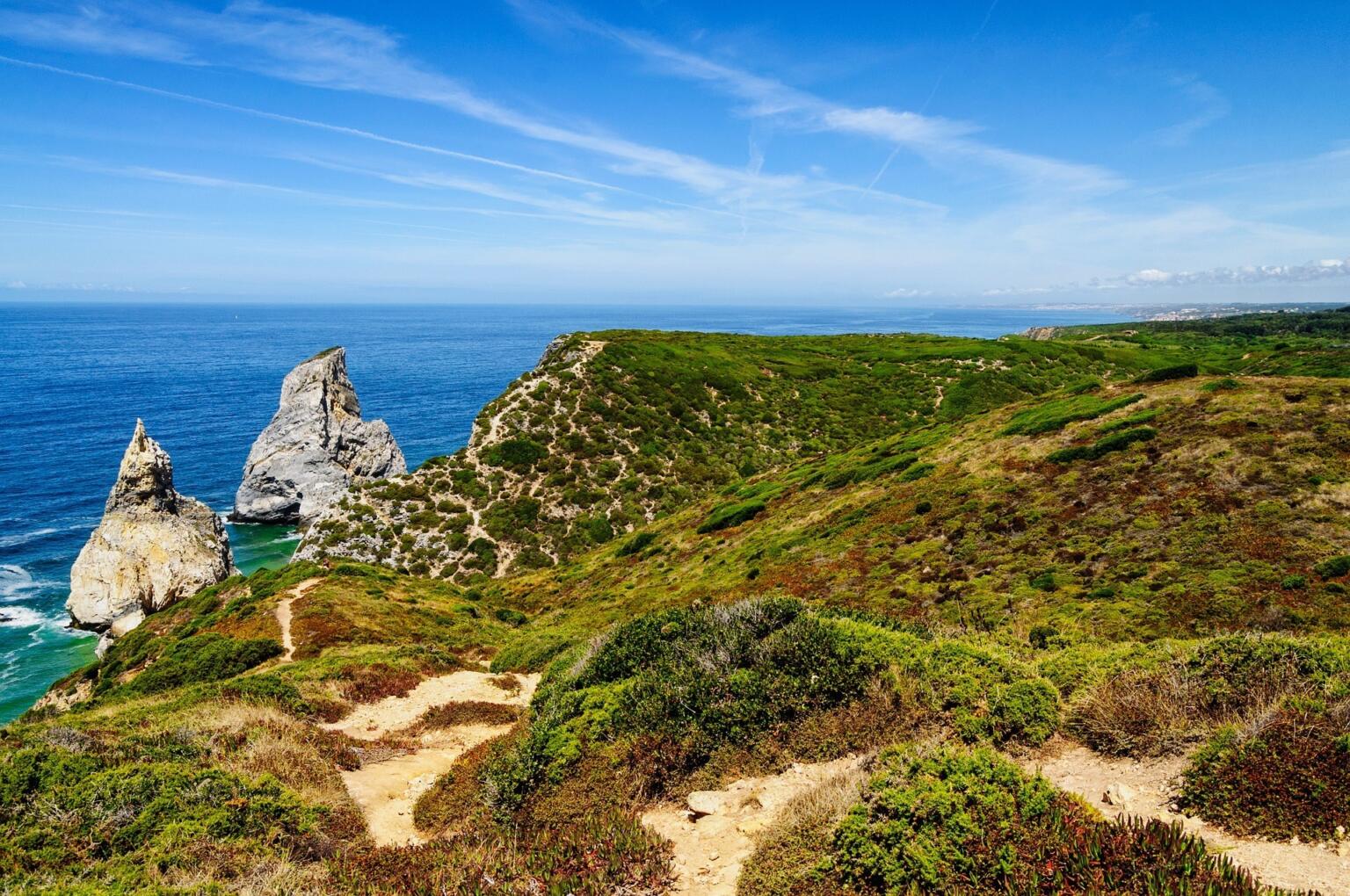
There’s more crime in Lisbon and Porto, thanks to a higher concentration of people, tourists, and poverty. That being said, there aren’t really any no-go areas.
Portugal isn’t crime-free but it is still a very safe place to live.
There’s a lot of bureaucracy, so be prepared for that. And, remember, road safety isn’t the best.
Do your research, get on some expat forums (there’s are sizeable expat populations all over the country), and make some connections. Even though it’s safe, being isolated isn’t very fun.

A new country, a new contract, a new piece of plastic – booooring. Instead, buy an eSIM!
An eSIM works just like an app: you buy it, you download it, and BOOM! You’re connected the minute you land. It’s that easy.
Is your phone eSIM ready? Read about how e-Sims work or click below to see one of the top eSIM providers on the market and ditch the plastic.
Grab an eSIM!Is it safe to rent an Airbnb in Portugal?
It’s more than safe to rent an Airbnb in Portugal. With the reliable rating and review system, you won’t just get to choose from awesome homes, but you can also read about the place you’re about to book in full detail. With the previous guest reviews, you’ll know exactly what to expect.
But keep in mind that hosts can also review their guests. This normally guarantees a very respectful and easy visit from both sides.
Is Portugal LGBTQ+ friendly?
Portugal is often referred to as one of the most LGBTQ+ friendly countries in Europe and worldwide. Members of the community are largely accepted, even in the more rural areas of the country. People are usually very open-minded and welcoming towards any traveller, no matter their sexual preference. You’ll find plenty of gay clubs and LGBTQ+ venues in big cities, such as Lisbon and Porto.
FAQs on Portugal’s Safety
Planning a safe trip to Portugal can get quite overwhelming. That’s why we’ve listed and answered the most frequently asked questions on safety in Portugal.
So, is Portugal Safe?
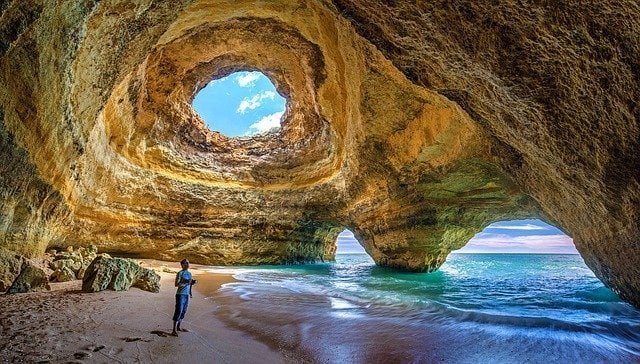
Portugal is the 3rd safest country in the world and that definitely shows: it’s a chilled out, beautiful and friendly place to travel with hardly ANY violent crime going on at all.
You’ll be in your element if what you’re used to is an uncomplicated, unscary, and historically rich place to visit, that’s for sure.
But just because it’s safe, it doesn’t mean that Portugal doesn’t come without its issues. Petty theft is a genuine problem and you’ll mainly find it to be the case in cities, and in particularly tourist places. Tourists are generally pretty rich compared to the poorest people in Portugal, so any chance to get a quick bit of cash from an unsuspecting tourist is going to be desirable.
At the end of the day, Portugal is very safe but isn’t devoid of problems. keep yourself safe by keeping your wits about you.
Disclaimer: Safety conditions change all over the world on a daily basis. We do our best to advise but this info may already be out of date. Do your own research. Enjoy your travels!

And for transparency’s sake, please know that some of the links in our content are affiliate links. That means that if you book your accommodation, buy your gear, or sort your insurance through our link, we earn a small commission (at no extra cost to you). That said, we only link to the gear we trust and never recommend services we don’t believe are up to scratch. Again, thank you!



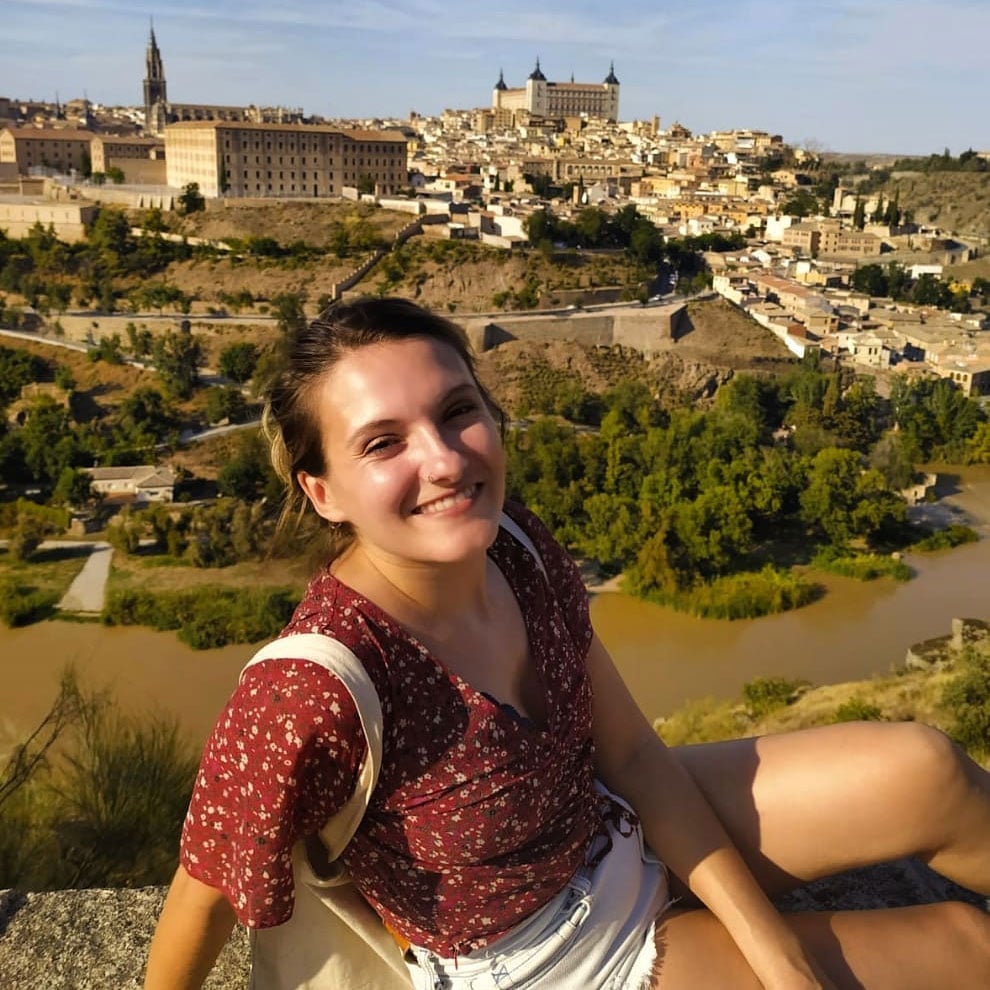
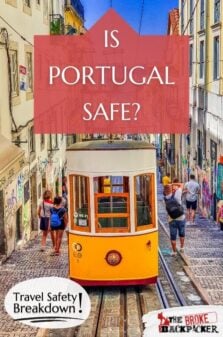


A note on petty theft, which is unfortunately true on very touristic places. Unlike the article says the vast majority of the organized thiefs are not local but also “tourists” (with temporary stays). This makes police work very difficult, even the ones undercover which are easily spotted by them (specially to “specialists”).
As it is my last day in Portugal (I’ve been here in the Algarve for a week) I feel compelled to share my experiences as a young female (19) coming from the US. I have not been able to find any other experiences similar to mine online, being that I do not in fact feel safe here as a woman–at least in the places I’ve been.
I would like to make the following disclaimer: I am aware my experiences may be less common than what most young female tourists have/will experience, I may be the outlier, but I still feel that it is important to share my encounters as they may serve some utility to young women.
I’ve visited just about every major city along the southern coast, I’ve been in multiple grocery stores and restaurants, and I have enjoyed exploring the old parts of the cities (specifically Tavira). 90% percent of the time I have been with my family. Every single time I’ve been out, without fail, regardless of who’s around me, multiple men will stare at me and watch me intently with whatever activity I’m partaking in–even if it’s scarfing down a massive falafel plate, which I did yesterday in a food court (with family around)…the guy would not break eye contact. About 30 minutes later I broke from my family to find a restroom, and another guy who had been watching me on and off followed me to the restrooms and stood outside, waiting until I got out, whereafter he followed me into other shops (maintaining a distance but nonetheless watching me). Today while at a beach a man was glancing at me so much that I didn’t feel comfortable taking my swimsuit cover off until he abandoned his towel to go into the water. When he returned, I saw him take pictures of me, at which point I requested that my family and I relocate to another part of the beach (and he watched as we walked away). At the same beach, we stopped at a cafe by the water, and a guy who did not break eye contact with me as we walked in got up and moved tables to be in visual range of me, rotating his chair 90 degrees to face me directly, and he watched me the whole time I drank a coffee. 3 days ago while I was exploring Tavira by myself (the only time I have been alone so far on this trip) I walked by some men who were sitting outside of a restaurant, drinking, one of whom made clicking noises at me; approximately 20 minutes later when I was walking through a particularly picture-esque alleway, snapping photos, they turned the corner and entered the alleway, staring at me intensely and approaching me, at which point I booked it. These were only a handful of encounters that I’ve shared out of the dozen I’ve had, but you all get my point. For me, it seems impossible to escape the male gaze here. Usually when this happens to me, I make eye contact with the guy, look behind me to pretend I think they might be looking at something else, and then look back, at which point most men will look away; here in the south of Portugal though, the men will maintain their gaze, even when I make an effort to show that I am aware of their presence and that they are making me uncomfortable. I have been to several European countries and states around the US, and I must say I have never experienced this phenomenon at THIS level of intensity and frequency. It makes me extremely anxious when I am out and about, and overall I don’t feel safe here, especially if I were to be by myself.